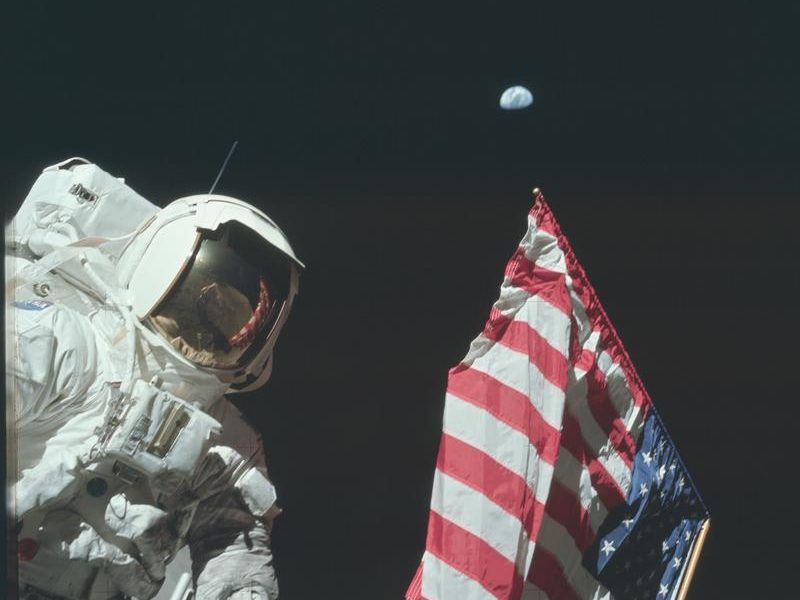The Apollo program gave a nation reasons to dream, it inspired its generation and generations to come, in those years Space flight was the absolute symbol of American resolve.
Interest in space flight at that intensity soon gave way to substantial budget cuts and a general loss of interest from the public.
The achievements and sometimes even technical know-how gained during this era has been forgotten or ignored.
Some of the pioneers of the Apollo programs remember the feeling of inspiring a nation and generations to come. And few better than the first female engineer to work in NASA’s mission control, and Presidential Medal of Freedom recipient Frances “Poppy” Northcutt.
It was against this backdrop and in celebration of the 50th anniversary of the Apollo moon landing that I talked to her about her new endeavour with National Geographic, their upcoming film and Documentary "Apollo: Missions to the Moon".
I also spoke to Emmy Award-winning director and director of the documentary Tom Jennings, Mr Jennings described the documentary as an amalgamation of rare and archival video footages, sound recording and broadcasts designed to create an immersive experience, giving viewers as close an experience to living through and experiencing the Apollo missions.
This film includes interviews and never seen video footage, of excellent quality, he praised NASA for providing them with” more footage than they could manage to go through” this sounds like it’ll be a most exciting watch.
Most Apollo documentaries in the past have been with an emphasis on the Apollo 11 mission, this experience intends a shift and covers everything from Sputnik to the beginning of the Space shuttle missions.
Giving audiences the feeling of an extremely immersive feature film, and helping contextualise the beginning of Man’s space endeavours, its continuation and products of it.
Mrs Northcutt in an old interview described the Apollo missions engineers and planners, backers and Astronauts as Audacious for their effort, boldness and bravery.
For believing we could go to the moon and bring the crew back home safely, the scale of their effort becomes even more pronounced when you consider that an average smartphone today has more computing power than the Apollo Lunar module and that this computer ran everything from Onboard systems for navigation, Life support, Propulsion and Communication.
She also described her experience working on the mission as Life changing especially for her, given, she was the first woman working for NASA at mission control and all the media attention that brought her, raising her awareness about the discrimination against women that existed at that time, inspiring her to subsequently become very active in women’s rights and politics.
Space flight while inspiring was met with some opposition even in its early days, especially given the large budgets involves, detractors asked questions of why we are not spending all that money solving problems here on earth.
The response to that now, a response that was not available or possible in the Apollo days is; as a result of decades of space flight, numerous technological advancements in the fields of Medicine, Security, Transportation, Communication and Agriculture, advancements that directly affect and improve life on earth has been made possible.
Almost as important is the fact that all money spent on the space endeavour is spent on earth and employs earth's industries, and it’s citizenry, not a single dime is spent in space.
Mrs. Northcutt decries how all the initial investment in R&D, which is the most expensive part of a Rockets development, leading up to a successful mission, including things like the Avcoat heat shield, was almost entirely lost because of a lack of continuity after budgets cuts and an apparent loss of interest following the end of the Apollo program.
I believe that for space flight to be sustainable in the 21st century, it might require an initial investment from the government, but also and most importantly a sustainable economic model driven by the private sector.
Industries like Space tourism (orbital or sub-orbital), Asteroid mining, Lunar Mining and outposts and Colony building. If the technology is ready, the private sector can maintain a vibrant space flight industry.
So, while there’s a place and incentive for space flight resultant on nations competing just as in Apollo, for space flight at a large scale to be economically sustainable, unlike Apollo the private sector and a profit incentive must be a or the primary driving factor.
One of the debates in today's scientific circle is that of whether manned missions are of any significant advantage over robotic missions given the same mission objectives.
I think the answer is quite clear; robots will get better, humans not nearly as fast, if ever, and so without explaining in details what that entails, the critical reason why we do crewed missions according to Mrs Northcutt is we are Narcissistic creatures, citing social media as an example.
So, our Narcissism is likely why there’ll be a permanent human outpost on Mars or the Moon in the near future.
